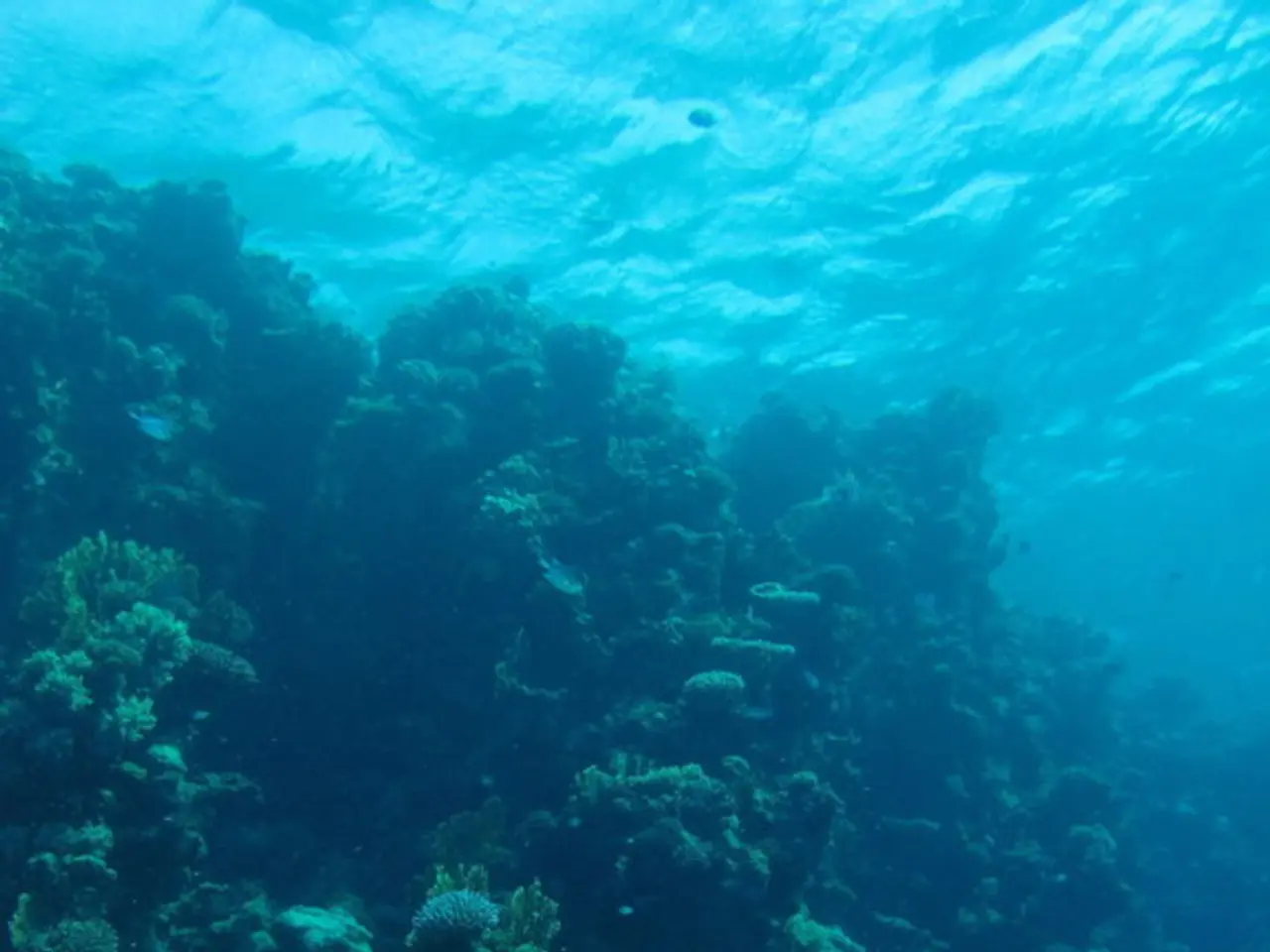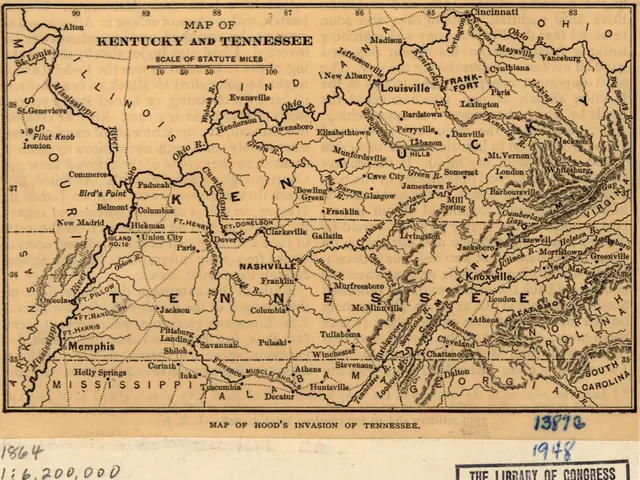Climate Change Imperils Hokkaido's Kelp: Exploring the Disastrous Effects on Japan's Oceanic Harvest
In the vast expanse of the Japanese seas, the effects of global warming are becoming increasingly apparent. Abnormal occurrences, once unnoticed beneath the ocean's surface, are now drawing attention due to the warming's impact on marine life.
Under a mid-range greenhouse gas emission scenario, the area of ice floe is expected to decrease to one-quarter by 2050. This shrinking ice cover could have far-reaching consequences, particularly for kelp forests, which are crucial habitats for marine species and play a significant role in carbon sequestration.
The projected impacts of continued global warming on kelp varieties in Japanese seas include significant declines and potential collapse of kelp forests due to increased ocean temperatures and associated environmental stresses. These impacts threaten the role of kelp as a habitat and nursery for marine species and its capacity for carbon sequestration.
Large-scale kelp and seagrass declines have already been observed worldwide, with many kelp forests collapsing due to marine heatwaves. This trend is expected to affect Japanese seas similarly, given the thermal sensitivity of kelp and their dependence on cooler water temperatures.
The collapse of kelp forests disrupts marine ecosystems significantly. Without kelp, there is less oxygen and increased ocean acidity, which harms other marine life. Juvenile fish and other species lose critical nursery habitats, lowering survival rates and biodiversity.
Warming waters can also cause sublethal effects such as reduced size and biomass of kelp species, weakening their ecological functions in habitat provision and carbon capture.
Japan has a history of kelp forest restoration using traditional methods like transplantation, seeding, grazer control, and artificial reefs. However, these methods have financial and scalability limitations and have not evolved substantially in recent decades. More sustainable approaches like kelp seed banking are emerging but need further development to address the ongoing and future impacts of warming seas.
While impacts related to temperature and ecological collapse are clear, the long-term effects of interventions such as seed banking remain not fully understood, indicating a need for continued research and adaptation in restoration efforts.
The town of Rausu in Hokkaido, known for producing high-grade konbu (kelp), a key ingredient in Japanese cooking, has been hit hard by these changes. Over the last 30 years, konbu harvests in Hokkaido have declined by two-thirds. In autumn 2023, the ocean surface temperature off the coast of Rausu reached 25 degrees Celsius, an unprecedented temperature for the area. In 2023, it was the cultivated konbu that was most heavily impacted, with some producers suffering a 50 to 80% decrease in harvest.
According to a study by Hokkaido University, four varieties of kelp could disappear completely from Japanese seas by the end of the century due to global warming. This would not only impact the local economy but also the marine ecosystem and carbon sequestration capabilities.
In addition to the decline in konbu, hauls of scabbard fish, a large fish prized on Japanese tables, are declining in western Japan, while they have increased 25-fold over the past decade in the northern prefectures of Iwate, Miyagi, and Fukushima. This northward shift in marine life distribution could be a result of the rising ocean temperatures caused by global warming.
The amount of sea ice in the Sea of Okhotsk is decreasing, falling by 56,000 square kilometers every 10 years. By 2050, under the lowest level scenario of greenhouse gas emissions, the area of ice floe in the Sea of Okhotsk south of the 46th parallel, close to Hokkaido, is forecast to fall to one-third of the average area from 1994-2017.
The rise in ocean temperatures caused by global warming is resulting in more frequent marine heatwaves. High seawater temperatures are causing poor growth of konbu in Rausu and other parts of Hokkaido.
In an unexpected twist, spiny lobster, typically found in warmer waters, has been sighted in waters as far north as Iwate Prefecture. This could be a sign of further changes to come in the marine ecosystem as global warming continues to impact Japanese seas.
In summary, the impacts of global warming on kelp forests and marine life in Japanese seas are significant and far-reaching. Existing restoration methods have limitations, and innovative, sustainable strategies will be crucial to support kelp preservation and marine biodiversity. As the situation continues to evolve, ongoing research and adaptation will be essential to mitigate these impacts and ensure the health of Japan's marine ecosystems.
[1] Source: Global warming threatens kelp forests in Japanese seas
[2] Source: Sustainable strategies for kelp forest restoration in a changing climate
[3] Source: Impacts of ocean warming on marine life in Japan
[4] Source: Changes in sea ice and ocean temperature off the coast of Hokkaido, Japan
[5] Source: Sublethal effects of ocean warming on kelp growth and biomass
- The global impact of climate change is becoming increasingly evident, with the effects felt even under the ocean's surface.
- The decrease in ice floes due to global warming could have grave consequences for ecosystems, particularly kelp forests.
- Kelp forests are crucial habitats for marine species and play a significant role in carbon sequestration.
- Increasing ocean temperatures are posing a threat to kelp forests, leading to significant declines and potential collapse.
- The loss of kelp forests could lead to increased ocean acidity and lower marine biodiversity.
- Sublethal effects of ocean warming, such as reduced size and biomass of kelp species, are weakening their ecological functions.
- Traditional methods of kelp forest restoration have limitations and need to evolve to address the impacts of warming seas.
- Advanced approaches, like kelp seed banking, are emerging but need further development for long-term adaptation.
- The decline in konbu harvests in Hokkaido over the past 30 years is a clear symptom of the impact of global warming on marine life.
- In 2023, ocean surface temperatures off the coast of Rausu reached an unprecedented 25 degrees Celsius, causing significant harm to cultivated konbu.
- Four varieties of kelp could disappear completely from Japanese seas by the end of the century due to global warming, impacting the local economy and marine ecosystem.
- The northward shift in marine life distribution could be a result of rising ocean temperatures caused by global warming.
- The Sea of Okhotsk is experiencing a decrease in sea ice, losing 56,000 square kilometers every 10 years.
- By 2050, the Sea of Okhotsk south of the 46th parallel could lose two-thirds of its average ice cover under the lowest level of greenhouse gas emissions.
- Marine heatwaves are becoming more common due to global warming, causing poor growth of konbu in Rausu and other parts of Hokkaido.
- The increase in ocean temperatures is allowing spiny lobsters, typically found in warmer waters, to be sighted in northern prefectures like Iwate.
- Changes in sea ice and ocean temperature off the coast of Hokkaido are crucial areas for further research and adaptation.
- Sublethal effects on kelp growth and biomass due to ocean warming require more studies for a better understanding of these impacts.
- Sustainable strategies for kelp forest restoration are essential for preserving marine biodiversity in a changing climate.
- Ongoing research and adaptation will be crucial to mitigate the impacts of global warming on Japanese seas.
- The health of Japan's marine ecosystems depends on innovative, sustainable solutions to combat the effects of global warming.
- The decline in konbu and other marine species could impact global cuisines that rely on these ingredients, particularly Japanese cooking.
- The impact of global warming on marine life extends beyond the fishing industry, raising concerns for personal and business finance, personal growth, and career development.
- The disruption of marine ecosystems could have far-reaching consequences in various sectors, from data and cloud computing to technology, travel,and entertainment like casino games, sports betting, and auto racing.








